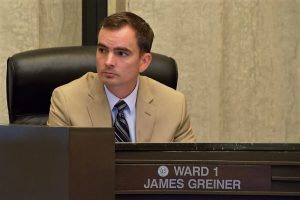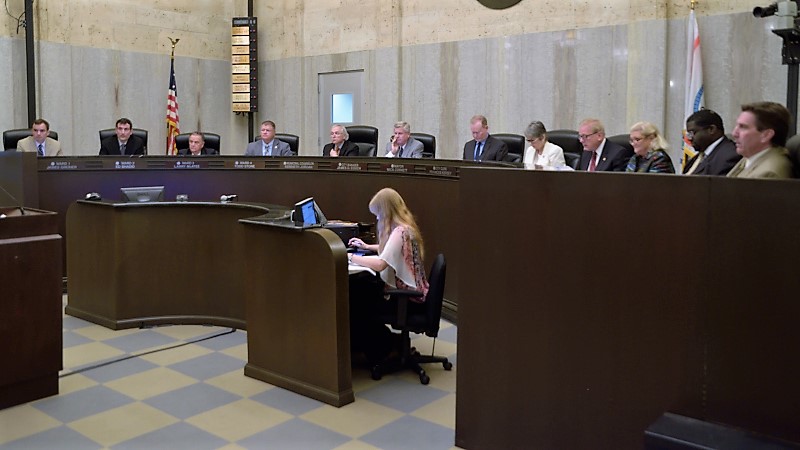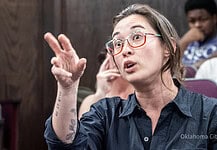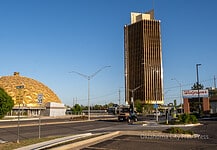Last Updated on June 21, 2017, 1:12 PM | Published: June 21, 2017
Sharp tensions rose Tuesday between the eight Oklahoma City Council members as they decided what projects voters would be asked to approve in an extension to the current temporary one-cent sales tax.
The tax has funded Metropolitan Area Projects 3, or better known as MAPS 3, which will run out at the end of 2017.
In May, by direction of the council, city staff proposed using three quarters of a cent for streets, and to establish a quarter cent as a permanent tax to improve police and fire protection.
That plan would not have changed the current 8.375 percent sales tax in the city.
But the new plan adopted Tuesday will mean an increase in the sales tax.
The council decided to expand the 27-month extension of the one cent temporary tax and commit it all for streets. Estimates are that the one-cent extension will raise $240 million.
On top of that, the council also decided to raise the permanent sales tax by a quarter cent to improve police and fire operations bringing in an estimated $26 million per year.
City residents will have the opportunity to vote on the measures separately Sept. 12.
Tensions
At one point, Councilman David Greenwell’s face, whole head and neck were red enough to be observed from the press gallery at the rear of the Oklahoma City Council Chamber, his voice louder than usual.
Visible anger from the normally gentle, measured councilman was a strong indicator of the higher-than-usual tensions over the proposal.
The issue was whose idea for the funds would prevail.
Greenwell and five other council members supported the original proposal to use the funds for streets, police protection and fire protection.
Councilman Ed Shadid wanted to use a portion of the funds for local schools in addition to streets, police and fire improvement.
He was highly critical of the way certain “third parties” had influenced the process. He was referring to the influence of the Greater Oklahoma City Chamber of Commerce.
In this four-minute interview with Free Press after the meeting, Shadid explained in detail how he thought the process had gone wrong:
And Councilman James Greiner had objections to the amount of tax being proposed but not the proposed projects. He argued for keeping the total load on the tax payers at the current rate.
“Even at three quarters of a cent, there would still be significant money to make the projects transformative,” he said to the Council.
He and Shadid voted against the parts of the proposals that called for a full cent for the temporary tax.

“One cent is an arbitrary number. It was 24 years ago. So is 3/4 of a cent for that matter,” Greiner told Free Press by phone later in the day.
It was a council struggling to find common ground on a complex set of issues. And the pressure was on.
Tuesday was the last day to complete the plan to meet a deadline for calling a public vote by Sept. 12. The vote needs to happen then so that if voters approve, the tax can pick up when the MAPS 3 tax ends.
Help for schools
Greenwell’s uncommon anger was directed at Councilman Ed Shadid who has pushed in past weeks to use a part of the proposed sales tax extension for aid to cash-strapped public schools in the city limits.
About 70 percent of the funds would have gone to Oklahoma City Public Schools, the largest and most urban of the districts that takes covers the largest part of the city limits.
At the June 13 council meeting a string of 17 speakers weighed in for using a portion of the proposed new tax for helping public schools in the city.
They argued that the money was needed because the Legislature did not bring about significant new help for any public schools in the state and especially the high-needs schools of the urban areas.
Chamber ideas
But the Greater Oklahoma City Chamber of Commerce had a different idea about the money’s use and even how much it should be.
At the same June 13 meeting leaders of the Chamber introduced a new idea to increase the amount of the extension to the full penny and add the quarter cent as a permanent tax on top of it.
As we reported in earlier stories HERE and HERE, the Chamber surprised the council with the public proposal and seemed out of step with the public on support for public schools.
A SoonerPoll showed that among likely voters in September, a majority supported using a portion of the new temporary tax for supporting public schools in the metro.
But Chamber President & CEO Roy Williams told Free Press late Monday that Chamber leadership thought the one cent tax was so much a part of “the MAPS brand” that just three quarters of that would hurt future MAPS efforts.
“For 25 years when you say MAPS, people know it’s a penny,” Williams said.
GO bond
The new replacement 10-year, $967 million general obligation, or GO, bond proposal was hardly discussed Tuesday before being voted onto the September ballot.
Since the 2007 bond program will expire this year as well, the city was eager to replace it with a new bond program.
A general obligation bond is the city borrowing money and repaying it with property tax revenue.
Perhaps the lack of debate on the bond Tuesday was because it had been so highly processed earlier in the year.
Unlike the somewhat hazy plans for the how streets will be improved with the one-cent temporary tax, the GO bond proposals came out of extensive public meetings held in each of the eight wards in the city between Jan. 18 and Feb. 25.
Founder, publisher, and editor of Oklahoma City Free Press. Brett continues to contribute reports and photography to this site as he runs the business.










